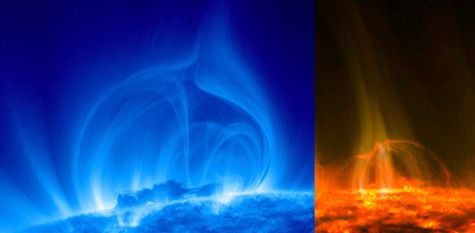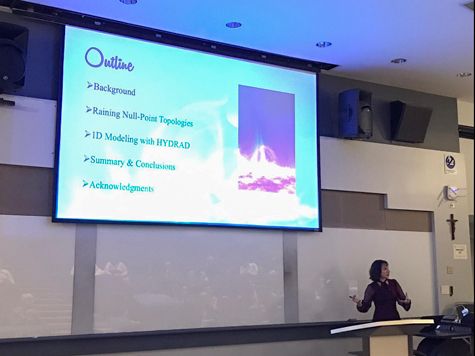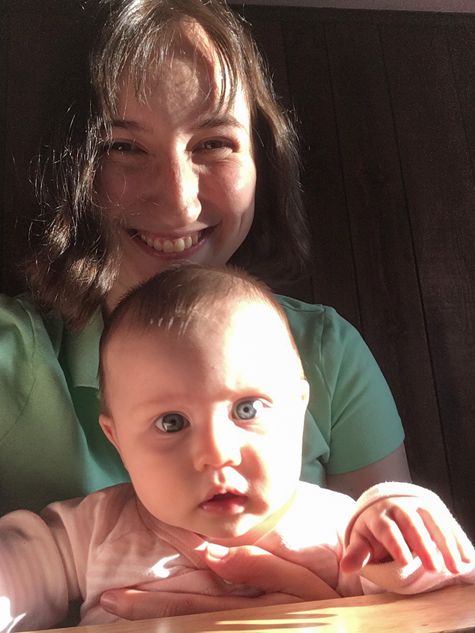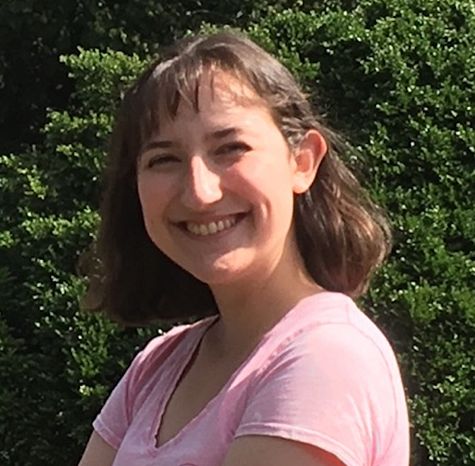Early Career Scientist Spotlight
Dr. Emily Mason
Solar Physicist
Solar Physics Laboratory (671)
What is your research focus?
I study the solar corona, specifically trying to disentangle magnetic field dynamics via observations (mostly in the extreme ultraviolet regime). One of the main issues with studying the corona, whose dynamics are dominated by the magnetic field, is that we can't observe the magnetic field directly – we have to use the plasma frozen onto the field as a tracer. However, plasma can be deceiving: there are many problems with line-of-sight effects and ambiguities concerning which field line the plasma is actually traveling along. It's a fascinating challenge. Currently for my postdoc project, I'm trying to trace packets of slow solar wind from their projected release points in null-point topologies to detections at 1 AU. To do this, I use a combination of remote observations, in-situ observations, and hydrodynamic computer modeling. That's just my main project, though – I have numerous side projects, including studying the dynamics of coronal rain formation in solar flares (which I shared with a fantastic summer intern), probing the shapes of coronal hole boundaries, and studying coronal mass ejection triggers.

Credit: Mason 2020
Did you always know that you wanted to be a solar physicist?
Definitely not. I was homeschooled until college, and my wonderful parents fostered all of my interests…which was very enriching but made it a challenge to pick one subject to which to devote a whole career! I loved space as a kid (who doesn't?), and I did save all of my summer job money for 2 years to buy myself a telescope in high school. But astrophysics was cheek-by-jowl with fashion design, writing, and veterinary medicine as far as job prospects. In fact, I graduated from college my first time through with concentrations in Asian Studies, political science, and American history. It was only once I was working after school and about to move to Asia for a graduate program that I realized I still really loved science, and I had to go back to school for almost another decade.
What is one research project that you are particularly excited about, and why?
My NPP project is really exciting because it combines so many different facets of the field. I wrote the proposal this way intentionally, to gain breadth of experience in the field, but I didn't expect it to be as interesting as it has proved to be. Starting from my set of observations in the very low corona, I'm working with fellow NPP Sam Wallace to use a solar wind propagation model (Wang-Sheeley-Arge, or WSA) to see when in-situ spacecraft are most likely to have been connected to plasma emanating from these regions. Then, I'll analyze those solar wind detection periods for slow solar wind and try to match the characteristics of that wind to the outputs of dozens of hydrodynamic models of recently-opened field lines. Not only will it hopefully provide good science results, but it really makes the case for having more observations along the Sun-Earth line, so that we can make these determinations more directly in the future.

Credit: Skarleth Motiño Flores
What skills are most useful to you in your work, and where did you develop those skills?
Coding is probably the single most useful skill. It's something that isn't taught in most universities to undergraduate (or even graduate) physics students, but it should be incorporated from day 1. And not just coding for science purposes, but the really important things like good coding habits, commenting procedures, version control, etc. that are critical but that none of us learn in on-the-job training. While I've learned several languages while at Goddard, I still have goals I'm working towards to hone my coding skills.
What aspect(s) of your work are you most passionate about?
Observations! My favorite days are the ones when I sit down with a new science question and pore over hundreds of EUV observations to unlock the mystery. The combination of a burning question, carte blanche to find something new, and a lot of (apparently) unrelated data just begging for an explanation to show the underlying organization is irresistible.
What science fact consistently amazes you?
To quote The Hitchhiker's Guide to the Galaxy, "Space is big. Really big." The size of the Sun just stymies understanding…a million Earths could fit inside it. When I talk about the "small" structures I study, they're over 5 Earths tall. If the Earth was sitting inside one of them, the sides of the dome would be about where GOES-15 (the Geostationary Operational Environmental Satellite) orbits.
What is a fun fact about you?
I met my incredible husband in the Building 21 cafeteria, during my third undergrad internship at Goddard, and we just welcomed our first baby this past winter (only a few months into my NPP)!

Credit: Emily Mason
Biography
Home Town:
New Paltz, NY
Undergraduate Degrees:
B.A. in Asian Studies, SUNY New Paltz, New Paltz, NY
B.A. in Astronomy, SUNY New Paltz, New Paltz, NY
B.S. in Physics, SUNY New Paltz, New Paltz, NY
Post-graduate Degree:
PhD, Catholic University of America, Washington DC

